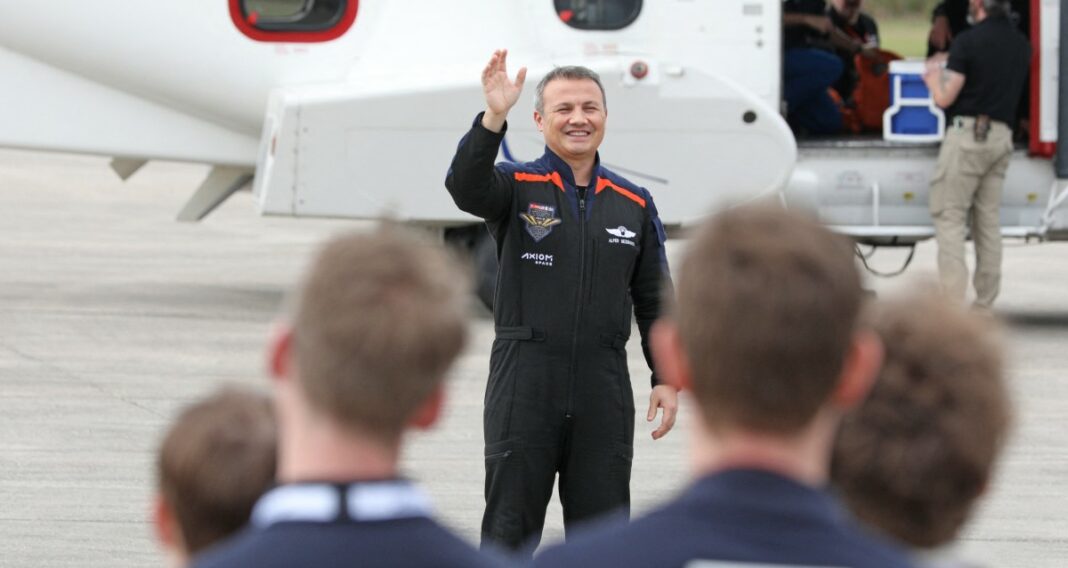Alper Gezeravcı, Turkey’s first astronaut, has embarked on a 14-day mission to the International Space Station (ISS), sparking a debate about the significance and intention of Turkey’s participation in the mission and whether it’s a scientific achievement or a political stunt aiming to raise the profile of the ruling Justice and Development Party (AKP) for the upcoming local elections in March.
The SpaceX Falcon 9 rocket, carrying the Crew Dragon capsule with Gezeravcı aboard, successfully launched from Kennedy Space Center on January 18 at 4:49 p.m. local time (2149 GMT). This mission, called Axiom Mission Three (Ax-3), represents Turkey’s inaugural venture into manned space exploration, with Gezeravcı set to arrive at the ISS by early Saturday, approximately 36 hours after launch.
Turkey's first astronaut, a Turkish Air Force fighter pilot and colonel, went to space and quoted Ataturk. pic.twitter.com/C6Q1BUo2Uw
— Lindsey Snell (@LindseySnell) January 19, 2024
Gezeravcı, who has gained the title of Turkey’s first astronaut, will spend 14 days on the ISS helping to conduct scientific experiments. These experiments span a range of topics, including the effects of microgravity on human health, the behavior of solid-fluid mixtures in zero gravity and the study of a plant species in space conditions.
Despite the scientific agenda, the mission has faced criticism.
Pundits with significant following on social media have questioned the mission’s scientific merit and economic justification, especially in light of Turkey’s current socioeconomic challenges.
Space tourism is not science. It is not a leap forward. My pet chimpanzee can go to low earth orbit for $55 million.
There are old ladies searching through garbage to find food in Turkey!!
What an utter disgrace! You should be ashamed of yourself for this cheap election stunt! https://t.co/xR7toiI21E
— Sinan Ciddi (@SinanCiddi) January 18, 2024
Sinan Ciddi, a non-resident senior fellow at the Foundation for Defense of Democracies (FDD), a Washington, D.C.-based nonpartisan research institute, described the mission as “not science” and “a cheap election stunt.”
Economist Özgür Demirtaş raised questions about whether the mission is a genuine scientific endeavor or merely a costly propaganda exercise.
Moreover, the mission’s funding has been a point of contention. The cost of chartering SpaceX hardware and services was set at $55 million per seat in 2018 when Axiom first announced the program. Comparisons have been drawn to India’s lunar mission, which reportedly cost $75 million, raising questions about the financial prudence of Turkey’s space endeavor.
A sense of the “realities” in #Turkey: a Turkish tourist will visit the International Space Station on a U.S. rocket. Ticket is paid for by the tax payers. State-owned TRT News reports: “Turkey is taking a historic step, highlighting our growing influence on the global stage” https://t.co/RLguOAXYvX pic.twitter.com/5uEAgC25lF
— Mike Kevrekidis (@Makis_Kevrekidi) January 18, 2024
On the ground, the launch garnered mixed reactions. In İstanbul, a public viewing event at Taksim Square attracted fewer people than anticipated, reflecting a divided public opinion. While some expressed pride and excitement, others voiced concern about the country’s priorities, citing issues like poverty and economic hardship.
President Recep Tayyip Erdoğan, in a message on X, emphasized the mission’s alignment with Turkey’s National Space Program, announced in 2021. He highlighted the mission’s potential contributions to science across various fields, including astronomy, medicine, genetics and materials science.
Gezeravcı, who is accompanied by astronauts from Spain, Italy and Sweden, represents a broader trend of international cooperation in space exploration. The mission, organized by Axiom Space, is a sign of the increasing reliance on the private sector in realizing national space ambitions. Founded in 2016, Axiom Space plays a key role in facilitating access to space for countries and is also developing a commercial space station.
The Axiom 3 team will be on the ISS with seven other crew members and will conduct 30 experiments. These experiments are designed to improve understanding of the effects of microgravity on the human body and industrial processes.
Criticism on social media, including from prominent political figures, underlines that despite its scientific appearance, the mission could be seen as an extravagant spectacle for political purposes, especially given Turkey’s economic situation. The country is contending with a cost-of-living crisis marked by skyrocketing inflation, calculated at close to 65 percent year-on-year as of December.

